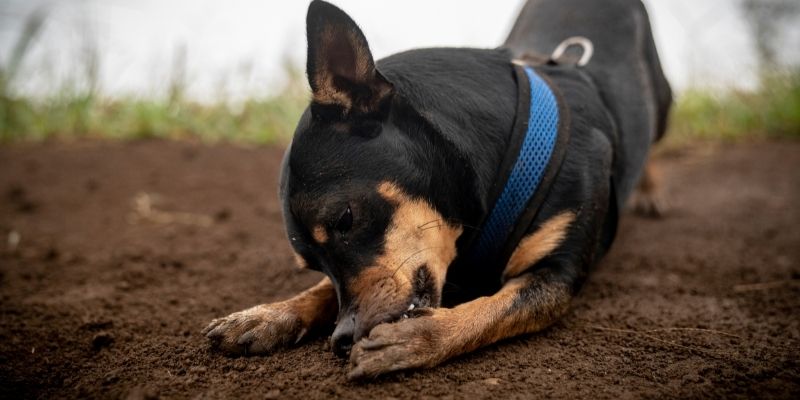Why do dogs chew on their paws? The answer to this question is not always clear. Occasional chewing and can even be fine. But in some cases, it may signify that something is wrong. E.g., some dog owners believe that it’s because dogs are bored, while others think the dog is trying to rid themselves of a flea or other icky bug. In reality, there are many different reasons why your dog might be chewing on their feet, and it’s essential for you as an owner to know what they are to stop them from doing so. This article will cover everything about dog chewing paws – most common reasons in dogs in puppies, history, ways to stop this habit, etc.
Do you have a specific question about dogs chewing paws? Then use the table of contents below to jump to the most relevant section. And you can always go back by clicking on the black arrow in the right bottom corner of the page. Also, please note that some of the links in this article may be affiliate links. For more details, check the Disclosure section at the bottom of the page.
Here's what we'll cover:
Why do dogs chew on their paws?
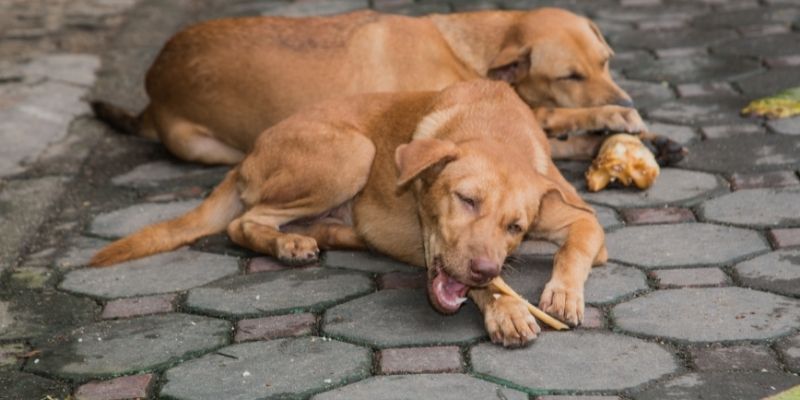
A dog might chew on its paws for one or more of the following reasons:
– It’s teething
– There there may be an irritating object stuck in its paw pad
– Because they’re bored
– They might be experiencing pain somewhere else. And this is one of the dog’s ways of managing it.
Dogs will also chew on their paws when they are anxious – similar to how people rub their hands together as a sign of anxiety. Chewing on their feet may help soothe sore feet or tendonitis and improve the dog’s sense of smell. It’s still not clear why some dogs do this more than others. But spending time with your dog, providing toys for them to play with, exercising them sufficiently, and reducing their stress levels should help reduce the behavior over time.

Can dog chewing on feet be a sign of an infection?
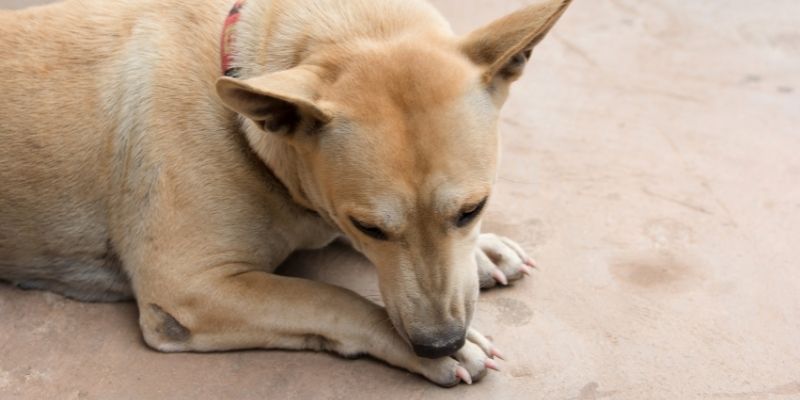
Yes, dog chewing on feet can be a sign of an infection. Infections of the paws are most common in dogs and puppies during hot or humid weather when the dog’s feet are more moist and contaminated with various bacteria from soil and feces.
One of the external parasites that may affect dogs and bring infections is Sarcoptes scabiei (itch mite) or scabies. The infection usually starts from the ears, elbows, and abdomen. But when it spread you can find it all over the pup’s body. Tunneling burrows with excrement dug by insects seen in the anal area, armpits, groin, and between toes.

What to do about dogs chewing on their feet?
The best way to discourage this behavior is by providing dog-friendly things for them to chew on. You can also distract them with a game, give them a treat if they do something good like laying down in their bed. And you can teach them basics commands through dog training classes or find out what dog’s triggers are through dog behavior training.

How can I stop my dog from chewing its paw?
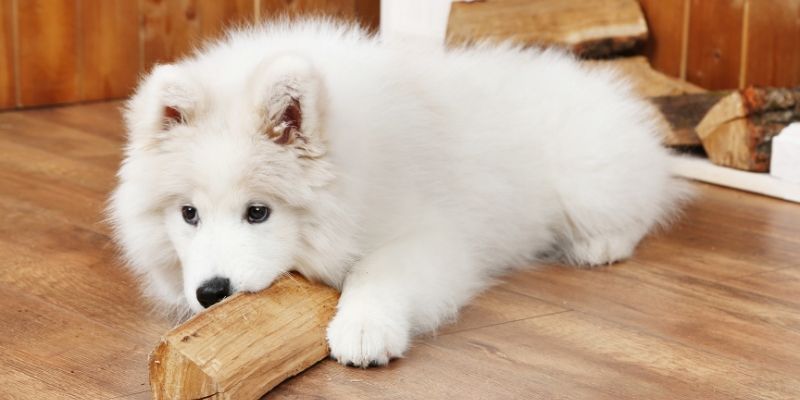
The dog’s paws are basically a means for sensory exploration. Give your dog plenty of attention during standard paw-chewing times. Things like walking outside to explore new stimuli, rubbing their noses and feet, or playing fetch, will help alleviate boredom and anxiety that may trigger the habit. Chew toys can also be designed for dogs to grab onto instead of their paws when they need soothing themselves – these include durable Kongs, e.g. model, stuffed with peanut butter or bread stuffing.
One way to discourage chewing is by applying bitter apple products on your dog’s skin which can discourage licking. However, the dog should typically chew on something appropriate like a toy or treat – rather than hands, furniture legs, etc. If there are any items around the house that the dog is chewing on, you may want to spray them with a bitter apple as well.
You might also try to stop your pup from chewing its paws with the training:
- Keep dog treats on you for when the dog shows interest in paws. Give the dog a treat while telling your pet what a good job they are doing when following the command “leave your foot.”
- Try to keep away from situations that might cause the habit of chewing the paw (e.g., when your pet is hungry or bored). Fill up their time with exercise, walks, toys, etc. This should distract them from chewing their paws.

How can I stop the dog from eating her own paws when she is pregnant or nursing?
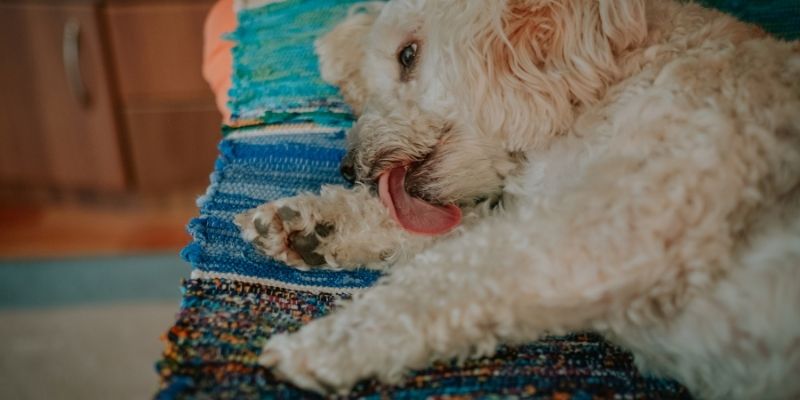
Dogs are considered omnivores, meaning they will eat both plants and animals to get what their bodies need from them. It is important that dog owners not only feed their dogs the best diet possible but also provide a wide variety of dog-friendly things for them to chew on
When a dog is chewing on its paws because she needs calcium, she has no way to get any during pregnancy or nursing. Calcium is essential for dogs because it helps them develop strong bones and teeth, muscle contractions, nerve signals, and blood clotting.
There are several ways you can supplement the dog with calcium, like giving her a bone with some meat on it or another treat that she likes, like canned sardines (bones removed). You also need to give her fresh water all day long. It will help regulate the dog’s bowel movements and promote better digestion, making it feel better overall.

What should I do when my dog chewed off paws skin?
If your dog has already chewed off skin or toes and started bleeding, apply pressure using cloth while carrying them. You also probably should call the vet for more animal emergency care suggestions. In any case of dog biting paws, report the dog’s behavior to the dog’s vet.
Thanks for the blog graphics: Canva.com

Thanks for the blog graphics: Canva.com
Doghint.com is a participant of several affiliate programs. The list includes (but not limited to) the following: VigLink, Refersion, ShareASale, and Amazon Services LLC Associates Program, an affiliate advertising program designed to provide a mean for us to earn fees by linking to Amazon.com and affiliated sites. Doghint.com does not intend to provide veterinary advice. All published articles are meant for informational purposes only and not substitute the professional veterinary consultation.

